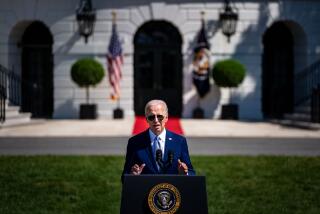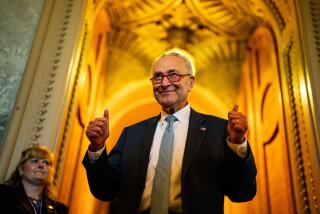Agreement Saves Tobacco Price Supports
- Share via
WASHINGTON — A fierce battle over rival plans to save the tobacco price-support program from collapse ended Friday when Rep. Charlie Rose (D-N.C.) surrendered to Sen. Jesse Helms (R-N.C.), clearing the way for final action by Congress next week.
Helms’ rescue plan, which includes letting cigarette companies buy out surplus tobacco stocks at an estimated $1.1-billion loss to the government, was attached by Senate and House conferees to a deficit-reduction bill designed to cut $56 billion from the fiscal 1986 budget. Congress is expected to pass the measure Monday or Tuesday.
“This is a black Friday the 13th for tobacco farmers,” declared Rose, who had sought to have smokers pay the burgeoning costs of the tobacco program by earmarking a penny of the 16-cent-a-pack cigarette tax for that purpose.
Lucrative New Programs
Rose bowed to Helms at a meeting called while there was a break in Senate-House negotiations over a massive farm bill that Congress also hopes to pass next week. Helms avoided trying to attach his tobacco plan to the farm measure for tactical reasons.
In the farm bill conference, negotiators approved lucrative new rice and cotton subsidy programs, but only after Midwestern legislators representing grain farmers forced trims in generous benefits originally sought by Southern sponsors.
The farm bill conferees also adopted a controversial provision requiring that up to 70% of international food aid be shipped on U.S. vessels instead of on less expensive foreign ships. Advocates of boosting the faltering merchant marine industry won acceptance of the provision despite concerns of farm-state lawmakers that millions of dollars in shipping subsidies could further depress exports.
The conferees recessed late Friday until today, vowing to reach agreement before letting Congress go home for Christmas. Major differences remained over dairy subsidies, grain-acreage cuts and food stamp benefits. And, to avoid a presidential veto, up to $5 billion may have to be chopped from the bill.
Helms, meanwhile, contended that his tobacco plan was the best way to reduce enormous economic pressure on tobacco farmers and boost sales.
Since 1982, tobacco growers have been assessed fees to pay for the cost of buying and storing leaf that the marketplace will not absorb at the price guaranteed by the government. With surpluses mounting rapidly, farmers are threatened with being unable to afford to pay for the program.
Helms’ proposal calls for lowering guaranteed minimum prices for tobacco in exchange for requiring cigarette companies to pay half the program’s costs. The companies agreed to buy out huge surplus stocks--but at a 90% discount, costing taxpayers an estimated $1.1 billion.
Rose, chairman of the House Agriculture tobacco subcommittee, protested that Helms’ plan, drafted with the help of tobacco companies, would force many small farmers out of business because it would not reduce imports.
More to Read
Get the L.A. Times Politics newsletter
Deeply reported insights into legislation, politics and policy from Sacramento, Washington and beyond. In your inbox twice per week.
You may occasionally receive promotional content from the Los Angeles Times.









